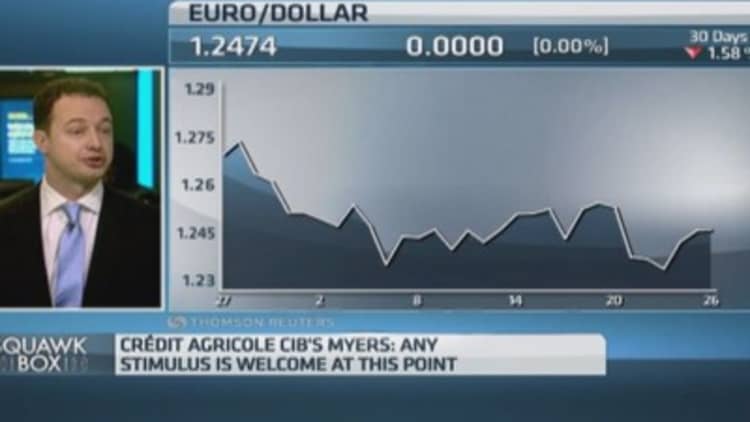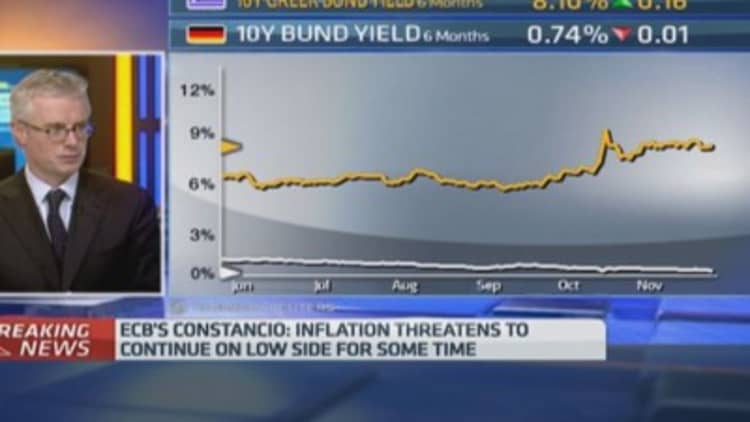
With the euro zone starring down the barrel of negative growth and weak demand, several market-watchers have placed their bets on whether Mario Draghi, president of the European Central bank (ECB), will announce more stimulus next week and push stocks another leg higher in the process.
Credit Suisse analysts were the first to throw their hat in the ring. They predicted in a research note Monday that Draghi will make an "explicit announcement" on a large-scale bond-buying program, commonly called quantitative easing or "QE". This would include the buying of sovereign debt, they added, and boost market confidence into year-end. Peter Oppenheimer, the chief global equities strategist at Goldman Sachs, has a base case scenario for a QE announcement early next year, but is expecting a 365 point rise for the Euro Stoxx 600 Index in 2015 with returns of 25 percent.
Indifferent year
This extra liquidity has the potential to spring new life into European bourses which have seen an indifferent year. The German DAX has clocked gains of 3.9 percent so far, the French CAC is up 2.1 percent and the pan-European Euro Stoxx 50 is higher by 7.6 percent.
Read MoreBundesbank warns investors on asset bubbles
Meanwhile, the euro has weakened in light of the predictions of these large-scale asset purchases. The ECB constantly iterates that the exchange rate is not a primary goal but its strength against the dollar has been crumbling with investors predicting a flood of extra cash in the euro zone economy. It has depreciated 10 percent against the greenback since its 2014 peak of 1.3933 in March. On Wednesday morning it was trading at 1.2460, easing lower after comments from the ECB's Vice-President, Vitor Constancio.
Constancio helped to soften lofty expectations of QE next week, saying that the bank would have a clearer picture on whether it should buy these sovereign bonds in the first quarter of next year, according to Reuters.
Kit Juckes, the global head of foreign exchange strategy at Societe Generale, believes that the general trend for the euro is still to the downside, estimating a move towards 1.20 against the U.S. dollar in the near term, But Juckes also urged investors to keep "pretty tight stops" on their short positions with its fall having the likelihood of some volatility.
Adam Myers, the European head of FX strategy at Crédit Agricole CIB, believes that "extreme" short positions in the single currency will unwind on some ECB disappointment next week, telling CNBC Wednesday that it could even rally against the dollar towards the end of the year.
Read MoreECB can decide on QE in first quarter: Vice President
Dip in stocks?
Any disappointment over a lack of further stimulus could feed through into the stock markets as well, according to Piers Curran, the head of trading at Amplify Trading. He believes that the Euro Stoxx 50 will end the year at current levels and will depend more on the ECB's refinancing programs that it has already launched.
"Even though consensus is for QE next year, there has been a build-up in expectations ahead of next week and no QE will be taken slightly negatively. To put a prediction on it - I would say (the Euro Stoxx 50 will be) no higher than we are now. A dip next week followed by a drift back to current levels by year end," he told CNBC via email.

Lothar Mentel, the chief investment officer at Paradigm Group, is another that believes that Draghi will not announce Fed-style QE next week. Regardless, he believes that the benchmark will still end the year at higher levels.
German skepticism
The underlying reason for the skepticism on Credit Suisse's bold predictions rest on the fact that the ECB still faces resistance on sovereign bond purchases. Germany is the largest euro zone country and would likely be the recipient of the largest amount of ECB cash under a full-scale QE program.
Read MoreGreeks to take to the streets again in jobless protest
Germany is traditionally the most concerned when it comes to more aggressive monetary policy. There are fears on the part of policymakers in the country that it could stoke inflation and give struggling euro zone governments an excuse for not implementing fiscal reforms. The President of Germany's Bundesbank, Jens Weidmann, warned Monday that the ECB could encounter "legal limits" if it pursued QE, according to Reuters.
Gemma Godfrey, the head of investment strategy at Brooks Macdonald, told CNBC via email that she has noted more skepticism than opposition from Germany recently, but still can't see a major policy move from Draghi next week.
"The (ECB's) asset backed security buying program has started to see loan demand revive in Italy. Unlike Fed-style QE which is dispersed globally, this program is targeting SMEs (small and medium-sized businesses) – a far more impactful driver of economic growth and jobs."


